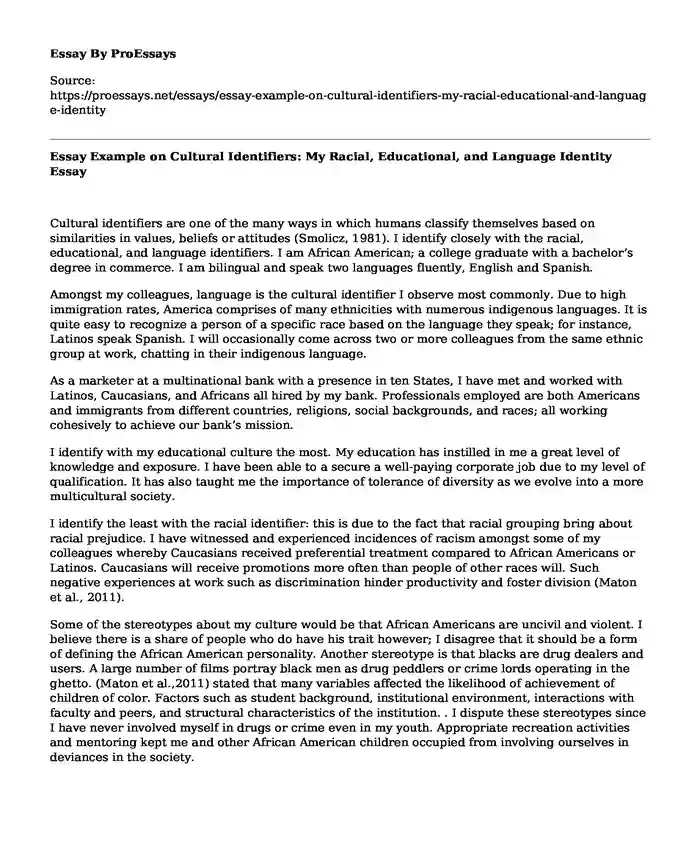Cultural identifiers are one of the many ways in which humans classify themselves based on similarities in values, beliefs or attitudes (Smolicz, 1981). I identify closely with the racial, educational, and language identifiers. I am African American; a college graduate with a bachelor’s degree in commerce. I am bilingual and speak two languages fluently, English and Spanish.
Amongst my colleagues, language is the cultural identifier I observe most commonly. Due to high immigration rates, America comprises of many ethnicities with numerous indigenous languages. It is quite easy to recognize a person of a specific race based on the language they speak; for instance, Latinos speak Spanish. I will occasionally come across two or more colleagues from the same ethnic group at work, chatting in their indigenous language.
As a marketer at a multinational bank with a presence in ten States, I have met and worked with Latinos, Caucasians, and Africans all hired by my bank. Professionals employed are both Americans and immigrants from different countries, religions, social backgrounds, and races; all working cohesively to achieve our bank’s mission.
I identify with my educational culture the most. My education has instilled in me a great level of knowledge and exposure. I have been able to a secure a well-paying corporate job due to my level of qualification. It has also taught me the importance of tolerance of diversity as we evolve into a more multicultural society.
I identify the least with the racial identifier: this is due to the fact that racial grouping bring about racial prejudice. I have witnessed and experienced incidences of racism amongst some of my colleagues whereby Caucasians received preferential treatment compared to African Americans or Latinos. Caucasians will receive promotions more often than people of other races will. Such negative experiences at work such as discrimination hinder productivity and foster division (Maton et al., 2011).
Some of the stereotypes about my culture would be that African Americans are uncivil and violent. I believe there is a share of people who do have his trait however; I disagree that it should be a form of defining the African American personality. Another stereotype is that blacks are drug dealers and users. A large number of films portray black men as drug peddlers or crime lords operating in the ghetto. (Maton et al.,2011) stated that many variables affected the likelihood of achievement of children of color. Factors such as student background, institutional environment, interactions with faculty and peers, and structural characteristics of the institution. . I dispute these stereotypes since I have never involved myself in drugs or crime even in my youth. Appropriate recreation activities and mentoring kept me and other African American children occupied from involving ourselves in deviances in the society.
Conclusion
Prejudice can be positive when discrimination occurs to protect a minority group (Maton et al.,2011). For instance, offering employment or appointments based on gender, race or disability rather than on qualifications. It ensures the same opportunities offered to marginal groups. Nomination of women into leadership positions promotes gender equity and increases their representation: this is a form of positive discrimination. However, it is difficult to identify positive discrimination because at times, the people elected may not be as professionally qualified as other candidates. Rather the appointment is only there to satisfy the gender parity rule not considering people who actually deserve the jobs; but are of different gender. This may seem like a form of discrimination to men qualified for the same positions.
References
Dahlgaard, S. M. P., Dahlgaard, J. J., & Edgeman, L. R., (1998). Core values: The precondition for business excellence, Total Quality Management, 9:4-5, 51-55, doi: 10.1080/0954412988550
Jensen. L. A. (2003). Coming of Age in a Multicultural World: Globalization and Adolescent Cultural Identity Formation, Applied Developmental Science, 7:3, 189-196, doi: 10.1207/S1532480XADS0703_10
Maton, I. K., Wimms, E. H., Grant, K. S., Wittig, A. M., Rogers, R. M., and Vasquez, J. T. M. (2011). “Experiences and Perspectives of African American, Latina/o, Asian American, and European American Psychology Graduate Students: A National Study.” Cultural Diversity and Ethnic Minority Psychology, vol.17.1 68–78. doi: 10.1037/a0021668
Smolicz, J. (1981). Core values and cultural identity. Ethnic and racial studies, 4(1), 75-90. https://doi.org/10.1080/01419870.1981.9993325
Cite this page
Essay Example on Cultural Identifiers: My Racial, Educational, and Language Identity. (2023, Sep 20). Retrieved from https://proessays.net/essays/essay-example-on-cultural-identifiers-my-racial-educational-and-language-identity
If you are the original author of this essay and no longer wish to have it published on the ProEssays website, please click below to request its removal:
- The Issue of Race in the United States Essay Example
- Essay Sample on Medication Error in the Adult Family Management
- A Life of Value: Cherishing Our One-Time Experience - Essay Sample
- Essay Sample on Deaf and Police: Marlee Matlin's Insight on Miscommunication
- Essay Sample on El Chapo: Exploring Social Class in a Diverse Way
- 3 Essentials from My Cabinet: Flashlight, Scissors, & Calculator - Essay Sample
- Comparison of Historical Events from Pre-Columbian Native American - Report Example







